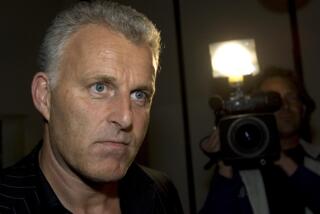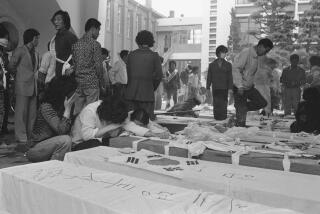COLUMN ONE : Apartheid Brutality on Trial : A former South African security police commander is first official charged by new government with crimes in the name of white rule. Case could shed light on attempts to sabotage transition to democracy.
- Share via
PRETORIA, South Africa — Several weeks after Nelson Mandela was finally freed from 27 years in prison in February, 1990, an undercover agent walked into a heavily guarded security police compound called Vlakplaas with an unusual proposal.
The plan: to funnel thousands of assault rifles and other deadly weapons to the Zulu-based Inkatha Freedom Party, the bitterest black rival of Mandela’s African National Congress. The goal: to sabotage South Africa’s fragile transition from apartheid to democracy.
The ensuing police-sponsored blood bath took thousands of lives over the next four years. The guns and other crucial police aid were used in train massacres and vicious township wars, by political hit squads and in black workers’ hostels that became armed fortresses of torture and death.
The Vlakplaas commander, Col. Eugene de Kock, goes on trial here today for allegedly running the former regime’s “Third Force” terror campaign aimed at destabilizing the country and derailing South Africa’s first free elections last April. The case may be the nation’s most explosive since Mandela himself was convicted in 1964.
De Kock, 46, is the first official charged by the new government with crimes committed in the name of apartheid. The shadowy cop, known as Prime Evil, faces 121 charges of murder, kidnaping, arms smuggling, fraud and theft. “His plea is he hasn’t committed these offenses,” said his attorney, Flip Hattingh.
Court records in the case grimly describe how security police stabbed, shot, burned and bombed their foes. Four AIDS-infected members of De Kock’s squad were even sent to spread the deadly disease among prostitutes in a Johannesburg neighborhood frequented by ANC sympathizers, according to two affidavits.
Expected to last a year, De Kock’s trial should shed light on the still-shrouded web of intelligence, military and police agencies under apartheid. Among other illegal acts, covert operations resulted in a terrorist bombing in London and a political assassination in Paris, the secret funding of right-wing groups in Northern Ireland and Washington, and the sale of sophisticated arms to renegade states and terrorist groups in the Middle East.
Many South Africans also are nervously awaiting dramatic revelations of secret police payments to informants and undercover operatives in the media, academia, corporations and even the ANC. Some are still public figures.
No one yet knows if De Kock will seek to implicate his superiors in the police, the Cabinet or even the office of Frederik W. de Klerk, the last apartheid-era president, who now serves as one of Mandela’s two deputy presidents. De Klerk’s Cabinet approved a still-unexplained payment of $343,000 to De Kock when he retired from the security police in April, 1993.
Mandela has frequently and angrily accused De Klerk of at least condoning Third Force activities. De Klerk’s government insisted that the feared security police, rather than fomenting violence, kept township peace while the black community was tearing itself apart.
“On the basis of one issue and one issue only have I crossed swords with Mr. De Klerk,” Mandela said recently. “That is his attempt to hide evidence of the Third Force and the deaths of thousands of people.”
De Klerk has denied knowledge or involvement and has suggested the Third Force was a rogue operation involving a small band of security police.
This much is clear: The Vlakplaas unit was publicly exposed in 1989 for using death squads, terrorist bombs and torture in South Africa and the neighboring countries of Lesotho and Swaziland. Yet it was only formally disbanded in 1993.
“Vlakplaas was the main brain, the main organizer, of black-on-black violence, the main heart of the Third Force,” said former police Capt. Dirk Coetzee, who headed Vlakplaas in 1980-81. He drew headlines around the world when he blew the whistle on its heinous activities in 1989.
*
A judicial inquiry and libel case substantiated many of Coetzee’s initial claims, although the police continued to deny them. No action was taken against De Kock, who took command of Vlakplaas in 1985. But chilling testimony linked him to numerous kidnapings and deaths, including the torture and point-blank execution of the brother of a suspected ANC guerrilla.
Vlakplaas hit-squad member Almond Nofemela testified that De Kock locked the man, Japie Maponya, in a sealed police van and then tossed in a tear-gas grenade. Afterward, he said, De Kock took “his pistol with silencer . . . then he shot him in the head.”
“When I worked with the death squad, I could think of nothing else but to kill,” Nofemela testified. “There was not a year that went past, since 1981, that I did not kill. I suffered a lot of nightmares until I became used to my work.”
In another incident, according to testimony, De Kock and his team set up an ambush for ANC members expected to cross the border from Swaziland one night in June, 1988. When a van appeared, De Kock emptied his Uzi submachine gun into it, killing two women and one man, all unarmed. A third woman, wounded and pleading for mercy, was killed on the spot.
Even worse, it was the wrong van. Four more bullet-riddled bodies arrived at the mortuary several nights later. De Kock and his squad were later cleared of wrongdoing when a constable who had participated in the shooting appointed himself investigating officer.
De Kock’s squad operated above and outside the law for the eight years he was in command, according to affidavits by four former colleagues. They executed witnesses and prisoners, bombed union and church offices, stole money and cars, falsified evidence and passports.
They suffocated suspects, beat them with shovels and tortured them with electric shocks to the genitals. They burned bodies so regularly that Vlakplaas cars hauled extra gasoline for the grisly task.
“Gene de Kock, just like me, carried 25 liters of petrol to burn the bodies,” said Coetzee, who will be a state witness in the trial. “Nothing sophisticated, nothing fancy.”
In the current case, prosecutors have charged De Kock mostly with crimes committed after October, 1990. “I had to cut off somewhere,” chief prosecutor Anton Ackermann said. “Before that was war.”
But Ackermann, who has separately charged at least 12 of De Kock’s Vlakplaas colleagues with murder and other crimes, expects others to be indicted as the high-profile probe proceeds.
“If you get a call at 11 at night and the message is, ‘Kill someone,’ it’s clearly from someone in command,” he said. “De Kock got those calls.”
At a recent court hearing, where the stocky, bespectacled De Kock chatted amiably with guards, his lawyer said De Kock may apply to a proposed truth commission for immunity from prosecution for political crimes.
“We can say he did it as part of his job, as part of his duties, and therefore it was an act with a political objective,” Hattingh said. But De Kock would have to provide a full confession to win exemption.
In some ways, De Kock was the inevitable product of the government’s blood-soaked attempts to prop up apartheid and undermine opposing black-run states.
In the early 1970s, he fought as a commando in the savage war to save white rule in Rhodesia, now Zimbabwe. He took over South Africa’s notorious Koevoet counterinsurgency police force in neighboring Namibia in 1983. The unit became infamous for atrocities against rebel soldiers and civilians.
Two years later, De Kock was given command of the security police anti-terrorist division at Vlakplaas, a 100-acre former farm along the Hennops River on the hilly western fringes of Pretoria. With townships erupting in violence under a brutal state of emergency, he quickly expanded operations.
Weapons were smuggled from Mozambique and Namibia, and storerooms were stuffed to the ceiling with dynamite, mortars, hand grenades, machine guns, mines, pistols with silencers, body bags and strychnine. One affidavit claims the Vlakplaas armory even included a SAM-7 ground-to-air missile.
Scores of captured or disaffected ANC guerrillas and other so-called “rehabilitated terrorists” were recruited for sinister missions--often under threat of death. The blacks were called askaris , a word of Arabic origin meaning native soldiers, and used such code names as Ninja, Vietnam and Ghost.
*
Although the brutality of the 4,000-member Security Branch was systematic across the country, experts say it relied heavily on Vlakplaas for the dirtiest jobs.
In most cases, De Kock’s unit was called in by local offices, allowed to carry out its deadly work and then returned to the farm for drunken celebrations. A smaller death-squad unit, based in the Eastern Cape region, was known as the Gestapo.
Although the vast majority of cases remain unsolved, the independent Human Rights Commission recorded more than 400 instances of death-squad activity between 1985 and 1990.
The essence of the current case, however, is that the security police at Vlakplaas subcontracted their work after August, 1990, by funneling arms, money, transportation and training to Zulu nationalists and other ANC opponents.
A report last March by a special commission on violence, headed by Judge Richard Goldstone, first confirmed the existence of the Third Force and accused De Kock and three senior police officials of directing a “horrible network of criminal activity.” The three retired from the force under a cloud but have not been charged.
In an interview last year, Goldstone lamented that his inquiry had barely begun to expose security force misdeeds. But he said he decided to go public before the plotters succeeded in aborting the April elections.
“It was really a case of a few rank amateurs trying to investigate an organization of real professionals,” he said. “We were no match.”
But Goldstone’s report led to De Kock’s arrest in May, a week after the election and four days before he was booked to fly to Portugal, where his wife already had fled. He had sold his car and house and had several false passports and two Swiss bank accounts.
Until recently, De Kock enjoyed an unusual life in jail. His cell was stocked with brandy, a steak knife, color TV, video recorder and other luxuries, according to court papers.
The cell door was unlocked, and he was taken on outings to a rugby club. He had unlimited use of a telephone and made hundreds of calls to Portugal, the Inkatha party, police headquarters and at least one witness who is scheduled to testify against him.
At a hearing in mid-December, Judge Brian Southwood angrily transferred De Kock to a maximum-security prison after noting that he “wouldn’t hesitate” to intimidate witnesses.
Coetzee, the former Vlakplaas commander, agrees. He noted official reports confirming that police and military files have been shredded or destroyed, presumably to obstruct the investigation into the reign of terror by lawless police.
“De Kock is in jail,” he warned, “but the people they trained, the arms they gave out, the operations they began, the monster they created are still there.”
More to Read
Sign up for Essential California
The most important California stories and recommendations in your inbox every morning.
You may occasionally receive promotional content from the Los Angeles Times.














